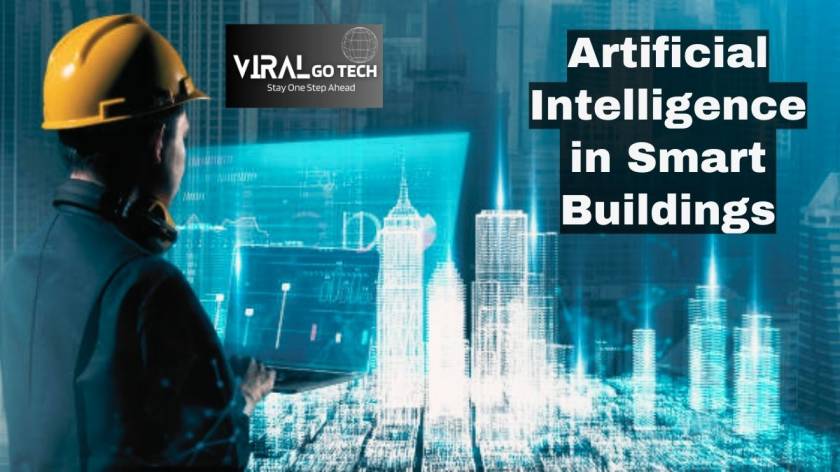Technology is influencing every aspect of our lives in the quickly changing world of today. Smart buildings are one industry where technological improvements are having a big impact. The future of smart buildings is changing in ways we could only have dreamed of with the introduction of artificial intelligence (AI). This article will examine the role of Artificial Intelligence in Smart Buildings, its advantages, and the difficulties and factors to be considered when putting this cutting-edge technology into practice.

Table of Contents
Introduction to Smart Buildings
Before we delve into the impact of AI on smart buildings, let’s first understand what smart buildings really are. A smart building is a structure that utilizes advanced technology and automation systems to efficiently manage its operations, enhance occupant comfort, and optimize energy consumption.
These buildings are equipped with sensors, actuators, and interconnected devices that collect and analyze data to make informed decisions and automate various processes.
What is Artificial Intelligence?
Artificial intelligence is the replication of human intelligence in devices that have been designed to reason and acquire knowledge similarly to people. It includes various technological innovations, such as robotics, computer vision, natural language processing, and machine learning. With the help of artificial intelligence (AI), machines can now recognize patterns, make predictions, and solve complicated problems—tasks that traditionally require human intelligence.
The Role of Artificial Intelligence in Smart Buildings
Artificial intelligence is essential for developing smart buildings into sentient beings that can respond to environmental changes as well as tenant requirements. AI systems can find trends, spot abnormalities, and make data-driven choices in real time by evaluating huge volumes of data gathered from sensors and other sources. This enables smart buildings to streamline operations, increase security, and optimize energy use.
How Automation and AI are Changing the Way We Manage Buildings
The integration of automation and AI technologies in smart buildings is revolutionizing the way we manage these structures. Traditionally, building management involved manual processes and reactive decision-making. However, with the help of AI, buildings can now be managed proactively and in a more efficient manner.
AI algorithms can continuously monitor and analyze data, predict maintenance needs, optimize HVAC systems, and even automate routine tasks. This not only reduces operational costs but also improves the overall performance and sustainability of buildings.
Benefits of Implementing Artificial Intelligence in Smart Buildings
The implementation of AI in smart buildings brings a multitude of benefits.
Firstly, AI enables predictive maintenance, which helps identify potential equipment failures before they occur, preventing costly breakdowns and minimizing downtime.
Secondly, AI-powered energy management systems can optimize energy usage by analyzing data on occupancy patterns, weather conditions, and energy consumption. This leads to significant energy savings and reduced carbon footprint.
Additionally, AI can improve occupant comfort by adjusting lighting, temperature, and ventilation systems based on individual preferences and real-time conditions.

Examples of Artificial Intelligence Applications in Smart Buildings
Artificial intelligence is revolutionizing the way smart buildings are managed and operated. Here are some examples of how AI is being applied in smart buildings:
Energy Optimization: AI algorithms can analyze data on occupancy patterns, weather conditions, and energy consumption to optimize energy usage. This includes automatically adjusting lighting, temperature, and ventilation systems to ensure energy efficiency and reduce utility costs.
Predictive Maintenance: By leveraging AI, smart buildings can implement predictive maintenance strategies. AI systems can monitor equipment performance and analyze data to identify potential equipment failures before they occur. This allows for timely maintenance and reduces downtime and costly breakdowns.
Occupant Comfort and Personalization: AI-powered systems can gather data on individual preferences and real-time conditions to personalize the environment for each occupant. This includes adjusting lighting, temperature, and other systems to ensure optimal comfort.
Security and Safety: AI-enabled security systems can analyze data from various sources such as surveillance cameras, access control systems, and sensors to detect and respond to potential security threats in real time. This enhances the safety of occupants and assets within the building.
Smart HVAC Systems: AI can optimize HVAC systems by analyzing data on occupancy levels, weather conditions, and energy consumption. This ensures efficient and effective heating, ventilation, and air conditioning, leading to improved comfort and energy savings.
Intelligent Building Automation: AI can automate routine tasks such as scheduling maintenance, managing energy usage, and optimizing space utilization. This frees up time and resources for building management teams to focus on more complex tasks and strategic planning.
These are just a few examples of how artificial intelligence is being applied in smart buildings. AI’s ability to process and analyze vast amounts of data in real time is transforming the way buildings operate, resulting in improved efficiency, sustainability, and occupant experience.
How Would AI be Used for Smart Buildings?
Different AI technologies can be used to fully realize the potential of AI in smart buildings. Utilizing historical data analysis and machine learning techniques, it is possible to anticipate equipment performance, energy consumption, and occupancy trends. Voice-activated controls and customized interactions between building inhabitants and systems are made possible by natural language processing. To keep track of occupancy levels, spot abnormalities, and maximize space use, computer vision can be used. Cleaning and inspection duties can be automated by robotics to increase productivity and decrease human error.

Challenges and Considerations for Implementing Artificial Intelligence in Smart Buildings
While the benefits of implementing AI in smart buildings are undeniable, there are also challenges and considerations that need to be addressed.
One major challenge is the security and privacy of data collected by AI systems. As smart buildings gather vast amounts of sensitive data, ensuring their protection from cyber threats and unauthorized access becomes paramount.
The complexity and integration of AI systems can pose challenges regarding interoperability, scalability, and cost-effectiveness. It is crucial for organizations to carefully plan and evaluate the implementation of AI to mitigate these challenges and maximize its potential.
Future Trends and Advancements in Artificial Intelligence for Smart Buildings
The future of AI in smart buildings looks promising, with several trends and advancements on the horizon. One such trend is the integration of AI with the Internet of Things (IoT), enabling seamless communication between devices and systems within a smart building ecosystem.
This will further enhance automation, optimize resource utilization, and improve overall building performance. Another trend is the development of AI-powered virtual assistants that can provide personalized recommendations, automate tasks, and enhance occupant experience.
Advancements in edge computing and cloud technologies will also play a pivotal role in enabling real-time data analysis and decision-making for smart buildings.
Case Studies of Successful Artificial Intelligence Implementations in Smart Buildings
To illustrate the practical applications and benefits of AI in smart buildings, let’s explore a few case studies. In a commercial office building in New York City, an AI-powered energy management system reduced energy consumption by 20% through real-time optimization of HVAC systems and lighting.
In a hospital in Singapore, AI algorithms were used to analyze patient flow data and optimize the allocation of resources, resulting in improved patient care and reduced waiting times. These case studies demonstrate the tangible impact AI can have on the performance and sustainability of smart buildings.
How to Get Started with Artificial Intelligence in Smart Buildings
If you are considering implementing AI in your smart building, here are a few steps to get started.
Firstly, assess your building’s needs and identify areas where AI can bring the most value, such as energy management, predictive maintenance, or occupant comfort.
Next, evaluate the available AI technologies and solutions in the market, considering factors such as compatibility, scalability, and ease of integration. It is also important to engage with experts and consultants who specialize in AI for smart buildings to ensure a successful implementation.
Finally, start with a pilot project to test and validate the effectiveness of AI in your specific building context before scaling up.

Conclusion
In conclusion, artificial intelligence is revolutionizing the future of smart buildings by enabling proactive management, optimizing energy usage, enhancing occupant comfort, and streamlining operations. The benefits of implementing AI in smart buildings are vast, ranging from cost savings to improved sustainability and occupant experience. However, challenges related to data security, interoperability, and complexity need to be carefully addressed. As AI continues to evolve and advancements in technology unfold, the future of smart buildings holds immense potential for creating intelligent, sustainable, and human-centric environments.
FAQs
What is a smart building?
A smart building is a structure that makes effective use of modern technologies and automated systems to streamline operations, improve occupant comfort, and reduce energy usage.
How does artificial intelligence benefit smart buildings?
Numerous advantages of artificial intelligence for smart buildings include predictive maintenance, energy management, increased occupant comfort, and automation of repetitive jobs.
What are some examples of AI applications in smart buildings?
Examples of AI applications in smart buildings include intelligent lighting systems, AI-powered security systems, and optimization of space utilization through occupancy analysis.
What are the challenges of implementing AI in smart buildings?
Challenges of implementing AI in smart buildings include data security and privacy, interoperability, scalability, and cost-effectiveness.
How can I get started with implementing AI in my smart building?
To get started with implementing AI in your smart building, assess your building’s needs, evaluate available AI technologies, engage with experts, and start with a pilot project to test and validate the effectiveness of AI in your specific context.